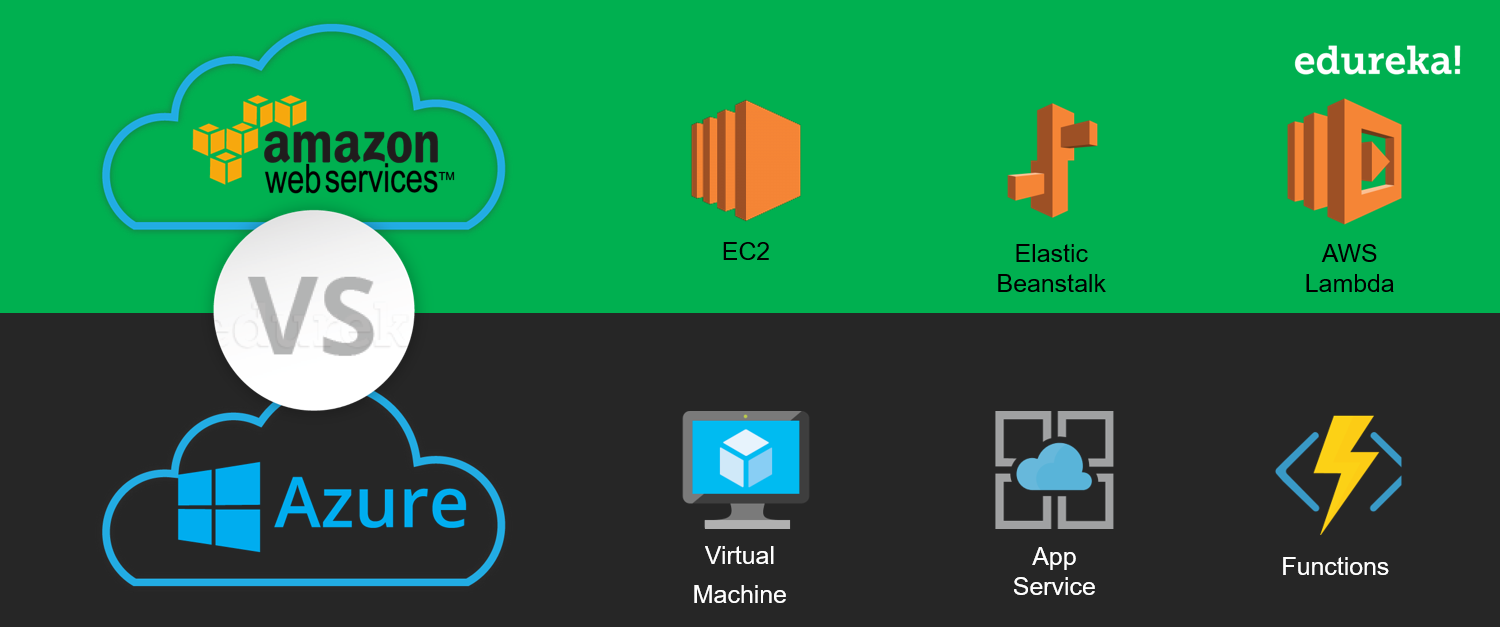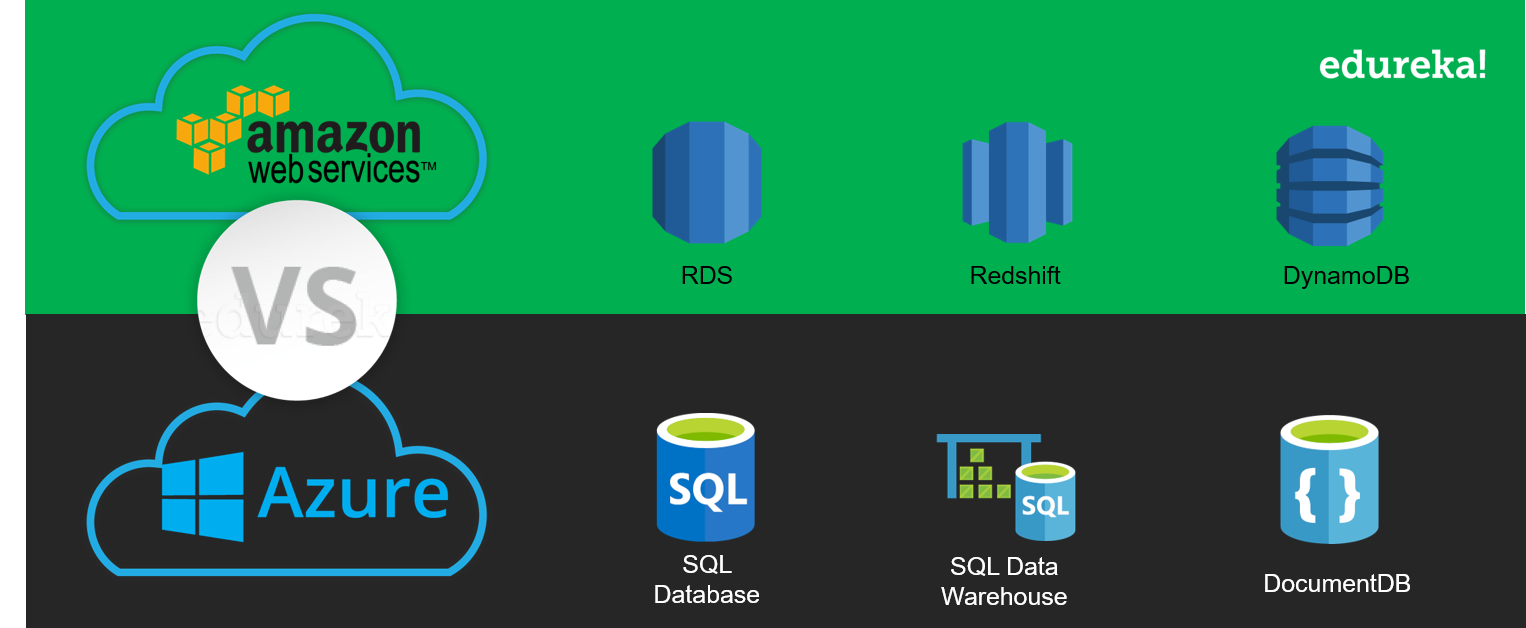AWS Certification Training
- 181k Enrolled Learners
- Weekend/Weekday
- Live Class
With Cloud Computing at its prime, various cloud service vendors have contested to claim supremacy in the Cloud domain. AWS and Azure have been relentless and have taken the top honors for a while now. However, the question that bothers people most is which Cloud vendor to choose. In this article on AWS vs Azure, we will compare these cloud giants to help you figure out what best suits your business needs.
So, let us get started.
AWS, or Amazon Web Services, was launched in 2006. It provides cloud solutions with more than 100 services related to databases, infrastructure management, app development, and web security. AWS, a subsidiary of Amazon, has offices in 16 different locations, with data centers around the world. Customers can use AWS services through a network of AWS servers worldwide. Instead of building physical servers, AWS is a way to purchase large-scale computing resources more cheaply and conveniently. This would subsequently help you choose one of AWS Certification or Azure Certification, which hold immense value in the current Cloud market from a career perspective.
Azure, or Microsoft Azure, is AWS’s competitor in the cloud computing market. Launched in 2008, Azure offers more than 600 services through a global network of Microsoft-managed servers. These services relate to AI, ML, Networks, Storage, development, and Virtual Machines.
This video on “AWS vs Azure” will help you understand and compare AWS and Azure and help you connect the dots to pick the best cloud computing service provider for you.
Find out our Azure Architect Training in Top Cities/Countries
| India | Other Cities/Countries |
| Bangalore | Toronto |
| Hyderabad | Singapore |
| Chennai | Dubai |
| Pune | Philippines |
The table puts forth a good enough comparison between these cloud giants based on some general features:
| Parameter | AWS | Azure |
| Date Of Initiation | 2006 | 2010 |
| Market Share | 40% | 30% |
| Open Source | More open to open source community | Less open to open-source community |
| Hybrid Cloud | It is a work in progress | Excels in Hybrid Cloud Market |
| Licencing | Offers more flexibility | Catching up with AWS |
| Linux Ecosystem | Extensive support for Linux | Still building up |
| Level of Encryption | High | Low |
| Pricing Model | Charges on an hourly basis | Charges on per minute basis |
| Flexibility | More flexible | Less flexible |
| User Interface | User-friendly and rich UI | Less intuitive |
AWS has several advantages, making it a popular choice for enterprises and companies. Some of the benefits are listed below:
Related Article: AWS Tutorial for Beginners
Related Program: Live Intructor-led Cloud Architect Training.
Now that the general comparison is out of the way Let us take a look at some Pricing numbers for the two giants,
There are many cloud platforms in the current application, but Microsoft Azure is the leading platform. Azure provides many services, including computing, analytics, storage, and networking. To improve your Azure skills, enroll in our AI 900 Certification course today!
Both Azure and AWS Pricing models offer a pay-as-you-go structure. AWS charges you on an hourly basis, whereas Azure charges you on a per-minute basis. When it comes to short-term subscription plans, Azure gives you a lot more flexibility. In the case of certain services, Azure tends to be costlier than AWS when the architecture starts scaling up.
Related Learning: AWS vs Azure vs Google Cloud
The next halt in this Azure vs. AWS article is the Compute parameter. Computation or compute services are one of the core services when it comes to Cloud Computing, which is understandable as the word “cloud” is used in the term. The best way to gain expertise in cloud computing is through the AWS Cloud Certification.
With the large amount of data being generated these days, there is always a need for faster means of processing. Compute services ensure you can spawn instances in minutes and scale up instances instantly if needed. AWS and Azure both have services that cater these needs. You can even check out the details of Migrating to AWS with the AWS Cloud Migration Course.

AWS offers services like EC2, Elastic Beanstalk, AWS Lambda, ECS, etc. Azure offers similar services, such as Azure Virtual Machine, App Service, Azure Functions, and Container Service. Thus, it is evident that these services are fairly close.
However, when you compare the costs, Azure instances tend to get costlier as their size increases. For example, with 256GB RAM and 64vPCU, AWS will charge you $3.20/hour, whereas Azure will charge around $6.76/hour.
Now that we have taken care of computation, the next big concern is storing this data. Let me shed some light on it.
Both AWS and Azure provide long-running and reliable storage services. AWS has services like AWS S3, EBS, and Glacier, whereas Azure Storage Services have Blob Storage, Disk Storage, and Standard Archive.
 AWS S3 ensures high availability and automatic replication across regions. When it comes to temporary storage in AWS, it starts functioning each time the instance starts and stops. On termination, it provides block storage similar to hard disks and can be attached to any EC2 instance or kept separate.
AWS S3 ensures high availability and automatic replication across regions. When it comes to temporary storage in AWS, it starts functioning each time the instance starts and stops. On termination, it provides block storage similar to hard disks and can be attached to any EC2 instance or kept separate.
Azure uses temporary storage and page blobs for VM volume. It also has a Block Storage option, which is a counterpart to S3 in AWS. In addition, Azure provides two types of storage: cold and hot storage.
So this was about Storage Services. Let us now take a look at how these two fare in terms of Database Services.
Related Course: AWS Masters Program
Data generated these days comes in different formats, so the databases that hold this data also need to evolve. AWS and Azure both provide different database services to handle both structured and unstructured data.

If you are looking for durability, AWS has Amazon RDS, whereas Azure has Azure SQL Server Database. Amazon RDS supports different database engines like MariaDB, Amazon Aurora, MySQL, Microsoft SQL, PostgreSQL, and Oracle, whereas Azure SQL Server Database is based on SQL, as the name suggests.
When you consider interface, Azure has a friendlier or a smoother one whereas AWS provides better provisioning with more instances. As it can be seen both tools have their features to boast of. If we were to talk about the reach of these services, they are fairly even with both having services for analytics and Big Data. AWS has Amazon EMR whereas Azure has HD Insights for the same. Azure also provides Cortana Intelligence Suite, which comes with Hadoop, Spark, Storm, and HBase.
In terms of maturity, AWS provides a more mature environment for big data.
Amazon Virtual Private Cloud (VPC) enables the creation of isolated networks under the Cloud umbrella. Users can create subnets, route tables, private IP address ranges, and network gateways.
Microsoft Azure Virtual Network, a counterpart to VPC, lets you do all the stuff VPC does. Both vendors have solutions to extend the on-premise data center into the cloud and firewall options as well.
We have already established that AWS provides more mature Big Data and analytics offerings. It has various services in its arsenal that cover domains like IoT, mobile app development, or the creation of a computing environment, depending on needs. They also offer support for Docker.
Microsoft is an equal here and may go a step further, as it offers Hadoop support with services like Azure HDInsight. Azure that Windows Server 2016 provides integration with Docker for both Windows containers and Hyper-V containers.
The platform also runs Windows or Linux containers.
Amazon has a great relationship with government agencies, ensuring better government cloud offerings. They also provide great security measures, ensuring proper access to individual users when it comes to accessing the cloud. This factor is crucial when companies are dealing with sensitive data.
Microsoft offers more than 50 compliant offerings. Some notable ones include ITAR, DISA, HIPAA, CJIS, and FIPS. When it comes to security, it’s neck and neck with AWS.
Elevate Your Career with an Expert-Led AWS SysOps Administrator Course!
AWS and Azure provide similar services, but they still differ based on multiple factors. Let’s discuss some of the differences between AWS and Azure:
Microsoft Azure is in the phase of becoming a more user-friendly and open-source community. This is also why AWS is more prevalent in the market with its easy-to-understand documentation and community.
AWS offers highly available storage solutions and automatically backs up data across several regions. Its temporary storage begins to operate whenever an instance is started and stops once the instances are terminated. AWS also provides block storage that can be attached to EC2 instances or kept separately if required.
Both AWS and Azure have machine learning models. The Azure studio, however, does not dive deep into complicated data engineering, unlike Amazon Sagemaker.
AWS is still transitioning to be more compatible with the hybrid cloud market. Azure is more established in this space as it provides functionalities extending beyond the on-premise data center. Its services are consistently connected with the private cloud and public services.
Both Azure and AWS make sure that their customers don’t have any issues regarding licensing. The customer only needs to pay for the services they use. In Microsoft Azure, you are eligible for license mobility if you already have purchased their service.
Once you are done, check out Google Cloud vs AWS comparison for more details.
Both Cloud platforms, as seen above, show potent capabilities, and it isn’t easy to pick a clear winner. Azure is great when it comes to hybrid cloud and integration with Microsoft’s stack of products, whereas AWS has more flexibility and extra features. It very much boils down to the requirements you or your organization has. So choose wisely. To learn more about Azure, join our Azure Cloud Engineer Course online. Also, If you wish to master the principles in Azure and DevOps and work on step-by-step tasks that have significant relevance for the world of business, industry professionals developed the Azure DevOps certification course syllabus. After completing the training course, you can apply for one of the top jobs in MNCs in the world with the highest salary.
Check out our AWS Certification Training in Top Cities
| India | Other Countries/Cities |
| Hyderabad | Atlanta |
| Bangalore | Canada |
| Chennai | Dubai |
| Mumbai | London |
| Pune | UK |
 Thank you for registering Join Edureka Meetup community for 100+ Free Webinars each month JOIN MEETUP GROUP
Thank you for registering Join Edureka Meetup community for 100+ Free Webinars each month JOIN MEETUP GROUPedureka.co